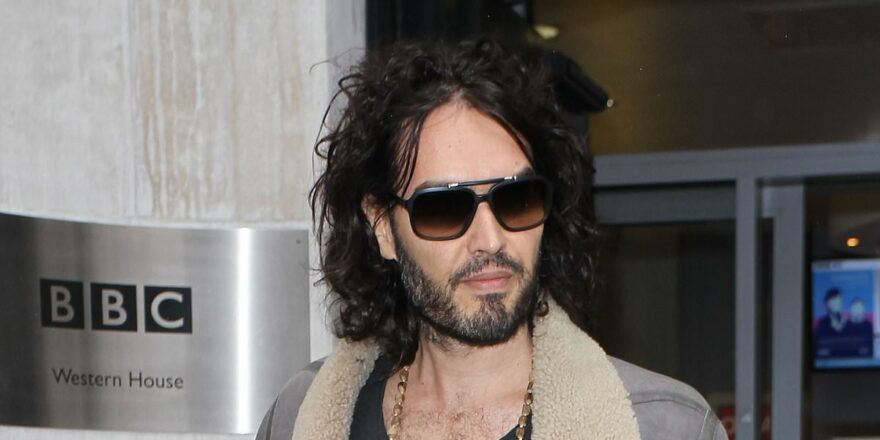Ex-BBC boss doesn't know why Russell Brand was so prominent at BBC
Ex-BBC boss Mark Thompson is ‘puzzled by Russell Brand’s prominence at the corporation’ – even though he was director-general at the time
Ex-BBC boss Sir Mark Thompson has spoken out on Russell Brand’s past at the corporation, admitting he is puzzled at why he was given such prominence – despite being director-general at the time.
The media executive was director-general of the BBC throughout Brand’s career on Radio 2, prior to the ‘Sachsgate’ controversy and the comedian’s eventual departure.
But Thompson, who who is set to take the CEO position at American news channel CNN, has said there was a ‘complete failure’ of editorial control which was ‘unacceptable’.
Thompson, now 66, denied any knowledge of any other editorial breaches on Russell Brand’s radio programme or the sexual allegations that have recently come to light, which Brand strongly denies.
Sir Mark Thompson (right), who was director-general at the BBC during Brand’s career, said he was confused why the comedian was so prominent
‘Sachsgate’
Brand and Ross triggered a barrage of complaints when they left obscene messages on the answerphone of Fawlty Towers legend Andrew Sachs in 2008.
The actor was the grandfather of Georgina Baillie, a dancer who Brand had slept with.
The BBC received more than 40,000 complaints and Sachs said he was horrified at what the pair had done.
Brand resigned from his show after he and Jonathan Ross’s prank call scandal in which they left lewd messages to Andrew Sachs’ referencing Brand’s fling with the Fawlty Towers actor’s granddaughter.
Thompson said it took him ‘no time at all to decide it was completely unacceptable’ and said there was a ‘complete failure of editorial compliance and judgement’ in allowing the show to be broadcast.
He said faith had to be put in the pyramid of editorial control, but admitted ‘sometimes things go wrong – and you’d expect them to’.
A month after Sachsgate, Thompson was summoned before the Commons culture, media and sport select committee to explain how such a ‘prank call’ could have been broadcast on the Radio 2 show.
Speaking on the Beeb Watch podcast, he said: ‘Russell Brand came into my radar, it was half term and I was abroad in Sicily I think.
‘So, I guess late on a Sunday after there was a piece in the Sunday newspaper which kicked it off so I really focussed on the Russell Brand show on the Monday.
‘I think, by Thursday we’d published a report about it and we’d seen some departures from the BBC and Russell Brand himself had taken the opportunity to resign from his own programme on the Wednesday.
‘Had he not resigned, I’m absolutely certain he would have left anyway.’
Podcast host Roger Bolton asked Thompson: ‘What I’m interested in, I wonder when you think looking back now, why did [Brand] get such prominence?
‘You look at it now and you think ‘why did it happen?’
Thompson answered: ‘I agree with that.
READ MORE – How much did the former BBC boss really know about Russell Brand?
‘Once the particular episode of the show which led to Russell’s departure and everyone’s departures came to light, and I got the chance for the first time – after it was broadcast and after indeed it had been rightly noted in a Sunday newspaper.
It took me no time at all to decide that was completely unacceptable.
‘And just by itself demonstrated there had been a complete failure of editorial compliance and judgement at the radio network which had approved it for transmission.
‘So, I want to say, it was not a difficult decision, or a close call, it was an egregious and completely unacceptable editorial mistake and we needed to act immediately and promptly and we did.
‘If, as it were, I had learned of other issues, I’d have acted on those as well.
‘My style was not to hold back on these things – if I felt something was wrong, my preference was to try and act very quickly.’
A review has been ordered by the current director-general, Tim Davie, but Thompson questioned how things like this could be prevented – bar pre-recording every single broadcast and having it checked by lawyers.
He added: ‘Would the BBC be better if everything was pre-recorded, listened to by senior executives and lawyers?
‘You wouldn’t do any live programming, you’d pre-record everything including the news and fact check it and all the rest of it.
‘The choice is made, in the end in the 1920s, was to create an organisation.
READ MORE – Russell Brand is accused of rape, sexual assault and emotional abuse
‘My guess is every year the BBC broadcasts perhaps 100 or 150 years worth of content.’
Sir Thompson said a ‘century and a half’s worth of content’ was produced by the channel via local radio stations, national networks and global news channels.
‘No human being could literally live long enough to listen and watch a single year’s output by the BBC,’ he added.
‘Therefore, you have a pyramid of editorial control, with a chain of command and you’re as good as your pyramid.
‘You try and make the best choices you can – sometimes things go wrong and you’d expect them to go wrong.’
Source: Read Full Article



